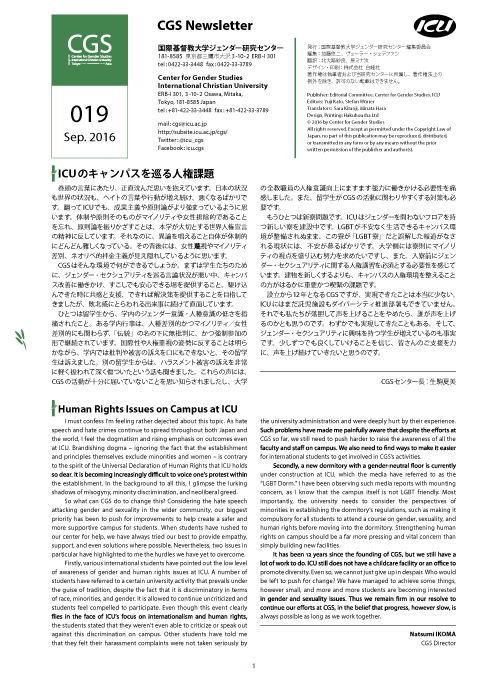Penko
ICU graduate (2016)
[The article below is the same as the article that appears in the nineteenth issue of the CGS Newsletter.]
Violets (sumire in Japanese), in the language of flowers, mean sincerity and everyday happiness, and the color purple is used worldwide in campaigns to end violence against women. Drawing on this symbolism, the Sumire Project (since 2016, Sumire Network) was launched in 2015 with the aim of raising awareness on dating violence and other forms of relationship abuse. The project is a joint collaboration by CGS and undergraduate students of ICU. CGS staff member Yuji Kato, who managed the Sumire Project, provides an outline of its activities below. Next, the student who inspired the project, writing under the pseudonym "Penko," shares her personal experiences and thoughts.
I was only a few months into my first year at ICU when I started dating a fellow freshman. He seemed kind and generous, buying me lunch and dinner, and always making time for us to be together. Over time, however, I began to realize that he had problems controlling his anger and managing his stress. Gradually, his anger, which he had initially directed toward his surroundings, came to focus on me. As violence and abuse became a part of my daily reality, I developed a twisted logic, telling myself, "It's my fault for always making him so mad," and "But I'm the only one who can truly understand and accept him for who he is." It was only on a trip home when my mother pointed out how pale I looked that I finally realized I was a victim of dating violence.
Even after we broke up, I suffered from post-traumatic stress. I'd have flashbacks whenever I passed by a spot where I'd been abused; I'd wake up in the middle of the night to the sound of my own screams; and, if I happened to see him or anyone who looked like him on campus, I'd start hyperventilating, unable to think about anything else. I knew I had to do something about it, so I started learning more about dating violence at a non-profit organization that a friend had told me about. That was how I started to deal with what had happened.
After a year had passed, feeling vulnerable and alone while coping with all the whispers around campus ("Did you know those two broke up 'cos he went crazy and treated her like dirt?"), I decided to share my story on social media. This generated a great deal of feedback and discussion, and made me realise the importance of addressing the problem of dating violence and the impact of disseminating information.
Through my work with other like-minded friends on the Sumire Project - organizing the Sumire Café, designing and handing out the dating violence pamphlet - I've realised that if you can't accept and care about yourself, how are you supposed to care about others? Even if you can't help feeling bad about yourself right now, don't try to hide or run away from it. It's important to be honest with yourself. Moreover, I know now that there's no "us" and "them." It's not just "crazy people" who resort to violence. We all have the potential to become abusive. We all have a psychotic beast within, which we strive to tame day by day.The people around me only saw me, "the victim," but not all people are violent by choice. I strongly felt that we need to pay attention to those who fail to tame their hidden beast. Looking back, I understand now that my ex-boyfriend and I did not have a relationship of mutual understanding in which we could be open and honest with each other. If we had, I wonder if I might have become more aware of the sadness and suffering hidden beneath his violence.
The past four years for me have been filled with questions about what love and relationships are all about. On the eve of my graduation, it has finally dawned on me that, to put it quite simply, the key is to be honest with oneself and with others. Of course I sometimes feel like half of my college life went to waste, but I know that's what has made me the person I am today, even though I do find it hard to remember that sometimes.
No one can deny that dating violence has occurred and continues to occur at ICU. When I was handing out pamphlets around campus, I'd hear people saying stuff like, "But I'd never do anything like that," or "I don't even have a boyfriend to start with." I remember when dating violence was discussed in my first-year Health Education course, I also thought it was someone else's problem. But then it happened to me. And from what I hear, it's still happening to others. It's a problem that touches us all.
In fact, we live in a web of human relationships, with friends, family, and so on. That's why the Sumire Project is not just about dating violence or romantic relationships - rather, its mission is to communicate the importance of building healthy relationships. I'm graduating this year, but I hope our work will be carried on by other students. Please contact CGS if you are interested in getting involved.
